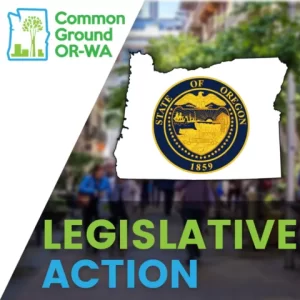Common Ground OR-WA’s 2025 Legislative Agenda
During the full legislative session, we are organizing to advance our bill to study the economic incentive and incidence effects of a split-rate land value tax, HB 2124, assigned to the House Revenue Committee.
We’re motivated going into the legislative session. Two of the larger cities’ mayors are advocating for LVT consideration. HB 2144 has one cosponsor, Rep. Hudson (D), who serves on the House Revenue Committee, and others are considering a cosponsor position. After passing our similar LVT study bill with one opposing vote in the Senate in the ’19 session (SB 702), we’re confident that political momentum is building to finally move our legislative priorities toward referral and passage of a constitutional amendment that enables use of a local option to land-weighted property taxation.
Here’s a recap of our recent and current efforts:
-
- Governor’s Housing Production Advisory Council (HPAC): The Council’s recommendations for legislative action included adoption of a land value tax. We submitted testimony in November ’24 that urged passage of our referral for a constitutional amendment authorizing a local option LVT, whereby counties or cities may by popular vote switch to a split-rate LVT system and be granted an exemption from Measures 5 & 50.We also addressed proper implementation: “Georgist organizations around North America, most especially in Pennsylvania, have firmly expressed the need for accurate and up-to-date property assessments, which is the only way that the built-in incentives of LVT can become effective. In fact, Common Ground-OR/WA has prepared language for a Best Practices Assessment bill, refining details with suggestions from Oregon Department of Revenue staff.”
We also addressed proper implementation: “Georgist organizations around North America, most especially in Pennsylvania, have firmly expressed the need for accurate and up-to-date property assessments, which is the only way that the built-in incentives of LVT can become effective. In fact, Common Ground-OR/WA has prepared language for a Best Practices Assessment bill, refining details with suggestions from Oregon Department of Revenue staff.”
Following an extensive article in The Oregonian about the HPAC’s consideration of tax increases to support housing production and affordability, the paper published our letter to the editor on January 24, 2024. It urged use of LVT as incentive taxation instead of new taxes and as a means to free urban land held in speculation for housing.
- Mid-Valley Council of Governments: The COG’s Legislative Committee invited us to present our legislative efforts for their consideration of support for a constitutional amendment authorizing a land value tax. While Salem defeated a payroll tax to support local services in November ‘24, they are interested in LVT’s potential to incent local economic development. We anticipate collaborating with the COG to advance our LVT study bill in the 2025 session.
- HB 2333: The bill would create a task force to study the impacts of Measures 5 and 50, the property tax limitations that Oregonians adopted in the Nineties. We submitted testimony to the House Revenue Committee recently that addresses the widespread horizontal inequities or disparate tax burdens across similar properties caused by use of maximum assessed values (MAV) instead of real market values (RMV). We encouraged passage of our LVT study bill, HB 2124, as a solution to the distortions of the measures.
- HB 2966: The establishes a task force to study and propose public financing strategies to reduce costs for infrastructure development, homeownership loans, and local government bonds. The Oregon Public Banking Alliance is leading the coalition to move this effort forward. Here, you’ll find the bill language and legislative one-pager. The House Committee On Commerce and Consumer Protection heard the bill on Jan. 28.
- SB 684: Directs the Housing and Community Services Department to establish a program to issue low-interest short-term loans for the construction of mixed income public developments. While not specifically targeted for lower-income homeowners, such financing would be helpful if a local-option land value tax is enabled, since it would incent redevelopment, ADUs, and increase housing supply.
- Governor’s Housing Production Advisory Council (HPAC): The Council’s recommendations for legislative action included adoption of a land value tax. We submitted testimony in November ’24 that urged passage of our referral for a constitutional amendment authorizing a local option LVT, whereby counties or cities may by popular vote switch to a split-rate LVT system and be granted an exemption from Measures 5 & 50.We also addressed proper implementation: “Georgist organizations around North America, most especially in Pennsylvania, have firmly expressed the need for accurate and up-to-date property assessments, which is the only way that the built-in incentives of LVT can become effective. In fact, Common Ground-OR/WA has prepared language for a Best Practices Assessment bill, refining details with suggestions from Oregon Department of Revenue staff.”
Excerpt from land value tax study bill – HB 2124:
The Legislative Revenue Office shall conduct a study of land value taxation. The study must include:
An examination of the tax burden effects of a change from the current system of property taxation under Ballot Measure 5 (1990) and Ballot Measure 50 (1997) to land value taxation.
Simulation model comparisons of tax applications using true market assessments and a revenue-neutral framework.
An examination of comparative economic incentive effects on classes of land use in selected local and rural jurisdictions.
An examination of comparative economic incentive effects on property in selected jurisdictions currently utilizing rural enterprise zone tax incentives.
An evaluation of tax burden relief measures that might accompany land value taxation, including a homestead exemption and property tax deferral for homeowners who are financially overburdened.



